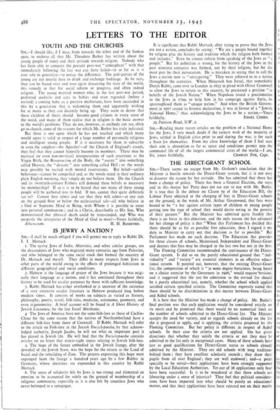IS JEWRY A NATION ?
SIR,—I shall be much obliged if you will permit me to reply to Rabbi Dr. I. I. Mattuck.
1. The native Jews of India, Abyssinia, and other similar groups, are the descendants of Jews who migrated many centuries ago from Palestine, and who belonged to the same racial stock that formed the ancestry of Dr. Mattuck and myself. They differ in many respects from Jews in other parts of the world owing to the effects of prolonged habitation in different geographical and social conditions.
2. Hebrew is the language of prayer of the Jews because it was origi- nally their language as a nation, and it has continued throughout their history to be used for secular purposes by those with sufficient knowledge.
3. Rabbi Mattuck has either overlooked or is unaware of the existence of a very extensive secular literature in Hebrew produced long before modern times. It consists of works on subjects as varied as history, philosophy, poetry, travel, folk-tales, medicine, astronomy, geometry, and even trigonometry. A brief account will be found in A Short History of Jewish Literature, by the late Israel Abrahams.
4. The Jews of America have not the same folk-lore as those of Cochin- China for the same reason that the natives of Northumberland have a different folk-lore from those of Cornwall. If Rabbi Mattuck will refer to the article on Folk-lore in the Jewish Encyclopaedia, by that acknow- ledged authority, Joseph Jacobs, he will see what an important part it has played in Jewish life. He will find that the Encyclopaedia contains articles on no fewer that ninety-eight topics relating to Jewish folk-lore.
5. The hope of the future embodied in the Jewish liturgy, after the downfall of the Jewish State, was the hope for the return to the Land of Israel and the rebuilding of Zion. The prayers expressing this hope were expunged from the liturgy a hundred, years ago by a few Rabbis in Germany, whose doctrines are expounded in this country by . Rabbi Mattuck.
6. The sense of solidarity felt by Jews is too strong and elemental an emotion to be accounted for solely on the ground of membership of a religious community, especially as it is also felt by countless Jews who never belonged to a synagogue. It is significant that Rabbi Mattuck, after trying to prove that the Jews are not a nation, concludes by saying: " We are a people bound together by religion plus the history and tradition which the religion both formed and includes." Even he cannot refrain from speaking of the Jews as "a people." But his definition is wrong, for the history of the Jews in the past nineteen centuries was formed, not by their religion, but for the most part by their persecution. He is mistaken in saying that to call the Jews a nation now is " anticipating." They were referred to as a nation throughout the centuries. When Menasseh ben Israel, that remarkable Dutch Rabbi, came over to London in 1655 to plead with Oliver Cromwell to allow the Jews to return to this country, he presented a petition " in behalfe of the Jewish Nation." When Napoleon issued a proclamation to the Jews in 1799, to help him in his campaign against Syria, he apostrophised them as " unique nation." And when the British Govern- ment in 1917 issued its historic declaration, it was in favour of a " Jewish National Home," thus acknowledging the Jews to be a nation.—Yours


























 Previous page
Previous page